Both people and our furry friends may benefit from the fun and cooling effects of swimming. If you’re fortunate enough to have a pool, you might be wondering whether you should wash your dog after they swim.
Because of how fragile their skin is, chlorine and other pool chemicals may be damaging. We’ll look into the query, “Should I wash my dog after swimming in the pool?”
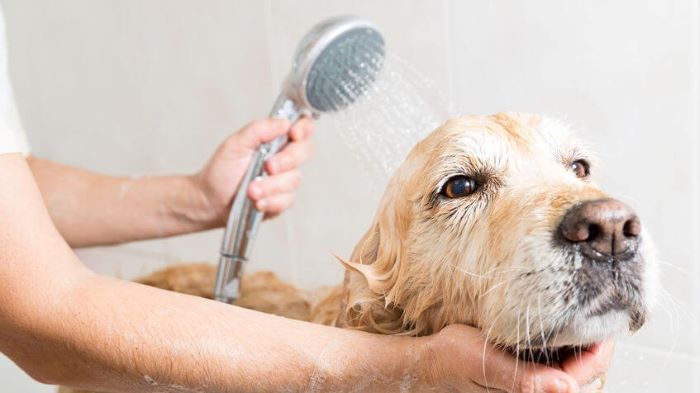
In this post, We’ll talk about the value of rinsing, why you should wash your dog after swimming in the pool with its risks, benefits, tips and some alternatives on how to wash your canine friend after swimming. So let’s get started and learn what’s best for your canine friend!
Contents
Why You Should Wash Your Dog After Swimming in the Pool?
Your dog may enjoy and feel cool from swimming in the pool, particularly on warm summer days. Pool water does, however, include chemicals like chlorine that, if not properly removed, might be unhealthy for your dog’s health.[1]
The following are some justifications for washing your dog after swimming in the pool:
Risks of Chlorine Exposure for Dogs After Swimming
Chlorine is a substance that is added to pool water to disinfect it and eliminate dangerous germs.
While being harmless for people in small amounts, chlorine may be poisonous to dogs in large concentrations, leading to a condition known as chlorine poisoning.
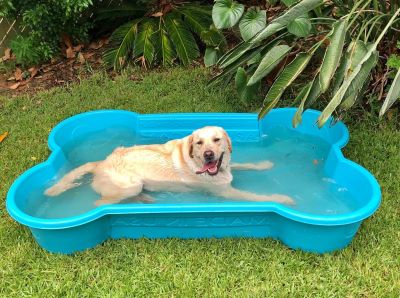
When dogs consume or breathe in significant volumes of chlorine gas, they may become poisoned. Chlorine poisoning in dogs can happen in a number of ways, including:
- Swimming pools: Dogs swimming in chlorinated pools run the risk of ingesting improperly handled pool chemicals or inhaling chlorine gas.
- Cleaning supplies: Dogs that come into touch with home cleaners containing chlorine, such bleach, may get oral irritation or skin burns.
- Water sources: Dogs who drink from polluted water sources, including chlorinated ponds or fountains, may suffer from gastrointestinal distress or esophageal erosion.
Some of the symptoms of chlorine poisoning in dogs are:
- Drooling
- Vomiting
- Abdominal pain
- Sore throat
- Bleached or smelly hair coat
- Eye irritation and redness
- Nosebleeds
- Difficulty breathing
- Burns on the skin or mucous membranes
If you suspect that your dog has been exposed to chlorine poisoning, you should contact your veterinarian immediately and seek emergency treatment.
Benefits of Washing Your Dog After Swimming
Your dog may have unfavorable skin and coat effects from swimming in the pool even if they do not have chlorine poisoning.
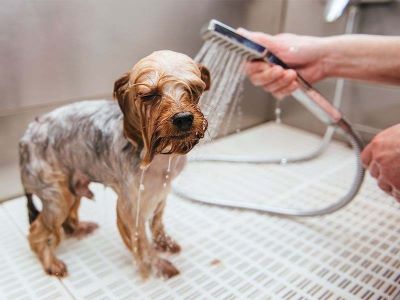
The eyes, skin, particularly the paws, and coat of your dog might get irritated by chlorine and other pool chemicals.
This is more likely if the pool’s chemicals are out of balance or the dog spends a lot of time in the water. Chlorine can have the following negative affects on your dog’s skin and coat:
- Dryness
- Itchiness
- Flakiness
- Dullness
- Brittleness
- Discoloration
You should thoroughly clean your dog with fresh water after swimming in the pool to avoid these issues.
By doing this, you can assist clean their fur and skin of any remaining chlorine and other pollutants.[2]
Rinsing off your dog can also keep them hydrated, since ingesting pool water can lead to electrolyte imbalance and dehydration.
Wash Your Dog Properly After Swimming
Although rinsing your dog off with clean water is a good initial step, it might not be sufficient to fully clean your dog after a dip in the pool.
Also, you might need to bathe your dog with a gentle shampoo made just for canines. This will aid in clearing away any dirt, debris, or germs that may have gathered on their skin and fur while swimming.
Shampooing your dog will also hydrate their skin and coat and help them return to their natural pH balance.
Tips on How to Wash Your Dog After Swimming
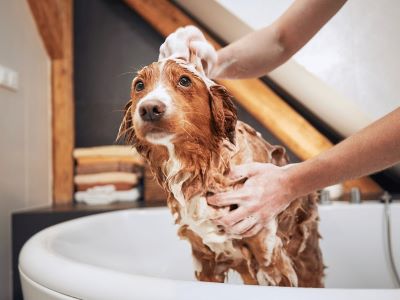
Here are some tips on how to wash your dog properly after swimming:
- Choose a shampoo that is mild, hypoallergenic, and appropriate for the skin and hair needs of your dog. Do not use shampoo that contains alcohol, harsh chemicals, or synthetic scents.
- Using lukewarm water, thoroughly wet your dog’s fur. Avoid using hot water on them since it might dry up and irritate their skin.
- Your dog’s fur should be lightly shampooed, and the shampoo should be softly massaged into the dog’s skin. Avert getting shampoo in their mouth, nose, ears, or eyes.
- Use clean water to fully rinse the shampoo off. Ensure sure their skin or fur is free of any soap traces.
- Use a soft cloth or a blow dryer set to low to dry your dog. Do not massage their fur too vigorously as this may result in tangles or breaking.
- To get rid of any mats or loose hairs, brush your dog’s coat. Employ a brush that is suitable for the length and kind of your dog’s coat.
- Praise, cookies, or toys are appropriate rewards for your dog’s good behavior.
Alternatives to Washing Your Dog After Swimming in the Pool
If you don’t want to wash your dog after every swim, or if washing is not possible or convenient, there are some other ways to keep your dog clean and healthy after swimming in the pool. Here are some of them:
Wiping Your Dog With a Damp Towel
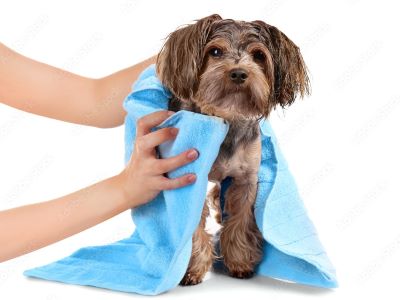
- Wiping your dog’s coat down with a damp towel is one of the simplest and quickest ways to get some of the chemicals and pool water out of it.[3]
- This can lessen odor, avoid skin irritation, and assist clean up some of the material that your dog could have ingested from the pool or the vicinity.
- The deeper layers of your dog’s fur or skin might not be reached by this procedure, and it might not be particularly successful in getting rid of all the chlorine, salt, or germs from their coat.
- Hence, even if your dog doesn’t swim much or has sensitive skin, you should still give them a gentle wash now and again with soap and water.
Brushing Your Dog’s Fur
- Brushing your dog’s fur after a pool dip is another approach to maintain their coat healthy and glossy.
- Brushing may assist your dog’s skin retain its natural oils, get rid of dead or stray hairs, and untangle any mats or knots that may have developed while swimming.

- Moreover, brushing helps increase blood flow and enhance your dog’s general health.
- Brushing your dog’s fur might not be sufficient to remove all debris or chemicals from the pool, and it might not be able to stop skin infections or ear issues that could arise from swimming.
- As a result, you should continue to inspect your dog’s skin frequently for any indications of problems and rinse their ears and coat with clean water after brushing them.
Spraying Your Dog With a Deodorizer
- Spraying your dog with a deodorizer after they’ve been in the pool is a third way to keep them smelling clean and fresh.
- After swimming, your dog’s coat may retain undesirable smells like chlorine, salt, or wet dog scent, which a deodorizer may help cover up or neutralize.
- A deodorizer can moisturize your dog’s skin and hair, as well as offer some UV or bug protection.
- However a deodorizer would not be particularly efficient in getting rid of or killing any potentially hazardous bacteria or fungus that could be present on your dog’s hair or skin after swimming, and it might not be able to stop allergic responses or dryness brought on by pool chemicals.
- As a result, you should continue to bathe your dog with gentle soap and water at least once per week and refrain from using deodorizers that contain alcohol, synthetic perfumes, or other harsh substances.
The ideal choice for keeping your dog clean and healthy after swimming in the pool relies on a number of variables, including the frequency of swimming, the style of pool, the breed of dog, and their specific requirements and preferences.
Some dogs could require more bathing than others, and some dogs might like a particular treatment over another. Monitoring your dog’s health and behavior after swimming is crucial.
If you see any issues or have any questions, contact your veterinarian. As long as you remember to properly care for your dog’s cleanliness and health thereafter, swimming may be an enjoyable and advantageous sport.
FAQs
Do I need to rinse my dog after the pool?
It is advisable to rinse your dog after swimming in a pool to remove chlorine and pool chemicals from their fur and skin.
Is it safe for a dog to swim in a chlorine pool?
Dogs can swim in chlorine pools safely as long as the chlorine levels are properly maintained and dogs are monitored for any signs of sensitivity or discomfort.
Do dogs get sore after swimming?
Dogs may experience muscle soreness after swimming, particularly if they are not used to regular swimming exercise. Gradual introduction and increasing swimming sessions can help prevent overexertion and soreness.
Can dogs get infections from swimming?
Dogs can potentially get infections from swimming, especially in water bodies with bacteria or microorganisms. Proper ear care, avoiding polluted water, and regular grooming can help prevent infections. Consulting a veterinarian is recommended if signs of infection are observed.
Conclusion
In conclusion of, Should I Wash My Dog After Swimming in the Pool?
- Maintaining your dog’s cleanliness and well-being after swimming in the pool is crucial.
- Rinsing them off with fresh water helps eliminate any chlorine or pool chemicals that could irritate their skin or cause discomfort if ingested.
- While chlorine pools are generally safe for dogs, it’s important to monitor their reactions and ensure appropriate chlorine levels.
Dogs can experience muscle soreness from swimming, so gradually introducing them to this activity and preventing overexertion is key.
Lastly, while infections are not common, it’s essential to take precautions by keeping your dog’s ears clean and dry and avoiding stagnant or polluted water.
By prioritizing their hygiene and health, you can ensure that your furry companion continues to enjoy their pool adventures to the fullest!
References:
- Staff, A. (2023). Dogs Drinking Pool Water: Dangers of Chlorine. American Kennel Club. – AKC
- California, S. O. (2017, June 20). Save Your Pet’s Life with These Simple Summer Tips | Cal OES News. Retrieved July 7, 2023, from – Cal OES News
- Beckley, R. (2023, April 11). Should I Wash My Dog After Swimming in the Pool? Dog Loves Best. Retrieved July 7, 2023, from – DogLovesBest

Dania is a dog groomer living in California, who loves styling dogs. She often uses dog accessories to keep them distracted while grooming. She is also a dog parent to a Pomeranian, Duke. It’s because of him she is always on a lookout for the best dog foods, toys, other dog accessories, and ways to keep him equipped, healthy and happy.

